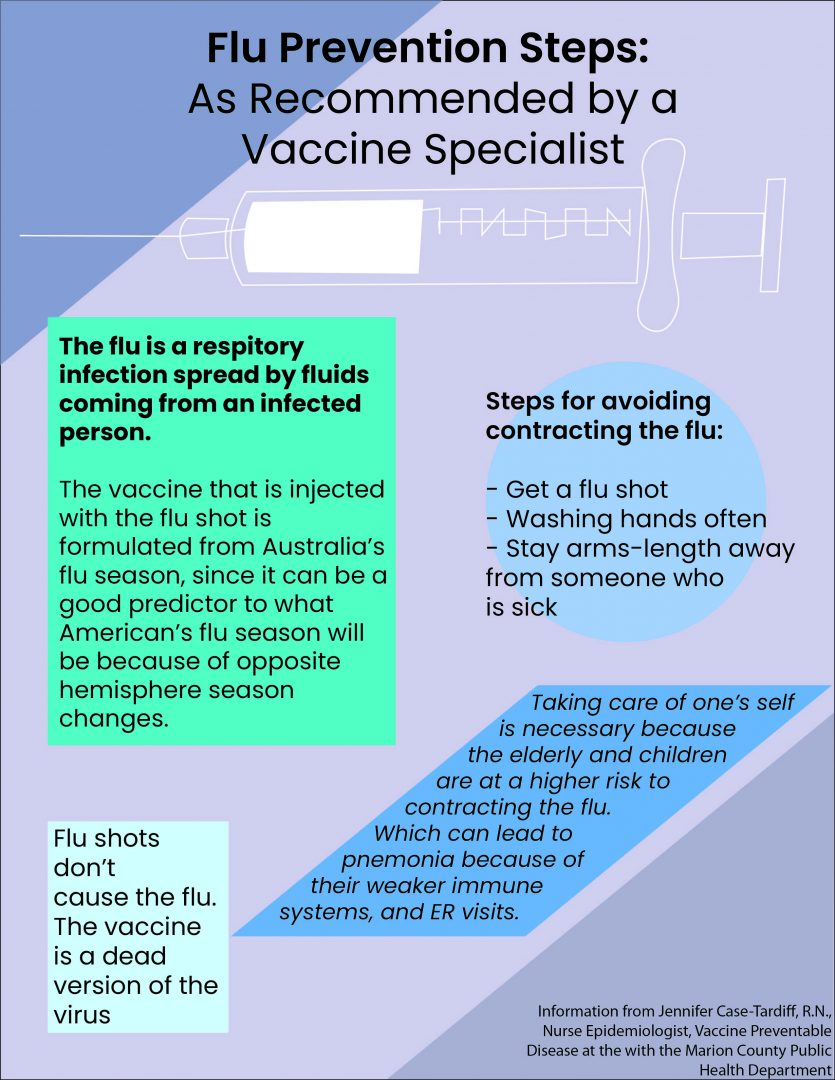As Indiana enters its winter flu season, residents should be aware of measures that can help prevent catching the flu. Jennifer Case-Tardiff, a nurse epidemiologist at the Marion County Public Health Department, said that students, faculty and staff should try to take care of their body. They should also try to sleep, get a flu shot and avoid people who are sick, she said.
“College students are a little bit at a high risk for the flu because of the close living quarters, and they share restrooms often-times,” Case-Tardiff said. “Obviously the more contacts you have in a day, the more opportunities that you have to come across somebody that is infected.”
The flu is spread through respiratory contact, meaning when someone coughs into his or her hand and then touches a doorknob, the next person who touches the infected doorknob will most likely get sick due to how often people touch their faces, Case-Tardiff said. She said the best way people can prevent the flu is not touching one’s face, but also washing one’s hands as often as possible. If someone looks sick, she said people should stay at least an arm’s length away from them.
The virus spreads quickly in winter because of the close proximity of people, Ryan Sanderson, a family medicine physician at Community Health said and it is not necessarily the cold weather bringing the virus. Sanderson said this time of year is not peak time, but he has seen cases of flu all the way into March.
“It’s that it’s cold so people end up spending a lot more time inside in close quarters,” Sanderson said. “That’s… why we ended up getting increased rates of the flu as well as increased rates of a typical viral illnesses this time of year.”
According to Case-Tardiff, because Australia’s winter is our summer, scientists tend to examine their flu to get an idea of what America’s flu season may be like. She said for those who get a flu shot, a dead version of the virus is created based off Australia’s flu and it is injected so the antibodies can be created to help fight off the virus. However, these antibodies cannot always prevent the flu because there are different strains of the virus that can be spread, Case-Tardiff said.
People cannot get sick from the flu shots, Case-Tardiff said. Most likely it is a different strain that got them sick or they were exposed to the flu prior to receiving the vaccine, she said. Case-Tardiff said getting a flu shot is a good idea regardless because it can lessen the strength of the flu if someone contracts it.
“The flu virus itself is an extremely tricky virus,” Case-Tardiff said. “So that’s why it’s tricky to make the flu vaccine because the virus is the great mimicker and it can change itself so quickly that we as humans can’t produce antibodies and grab all that information as quickly as the virus itself can change.”
Stress, which college students often have, releases more cortisol in the body, which in turn can hurt one’s immune system, Case-Tardiff said. Students, she said, especially around stressful times such as finals, should get plenty of rest, drink fluids and eat healthy. If students do not, the times where one stays up late will decrease performance in all aspects. The body tends to divert energy and resources towards stress, Sanderson said, which can make a person’s immune system weaker towards fighting off illness.
When symptoms arise such as a high fever, or if one is around someone who is sick already, and they starts to feel ill, they should go see a clinic as soon as possible, Sanderson said. A doctor visit at this time of year is needed because one never knows what type of virus they could have contracted.
Sanderson said students especially should prioritize their health, especially around stressful times like finals. Students should utilize the clinic that UIndy has in its Health Pavilion, he said, and if they cannot make it to an appointment there, there are plenty of Community Health Network MedChecks, Kroger clinics and multiple urgent care centers that can get students the medicine he or she needs, even after a night class.








